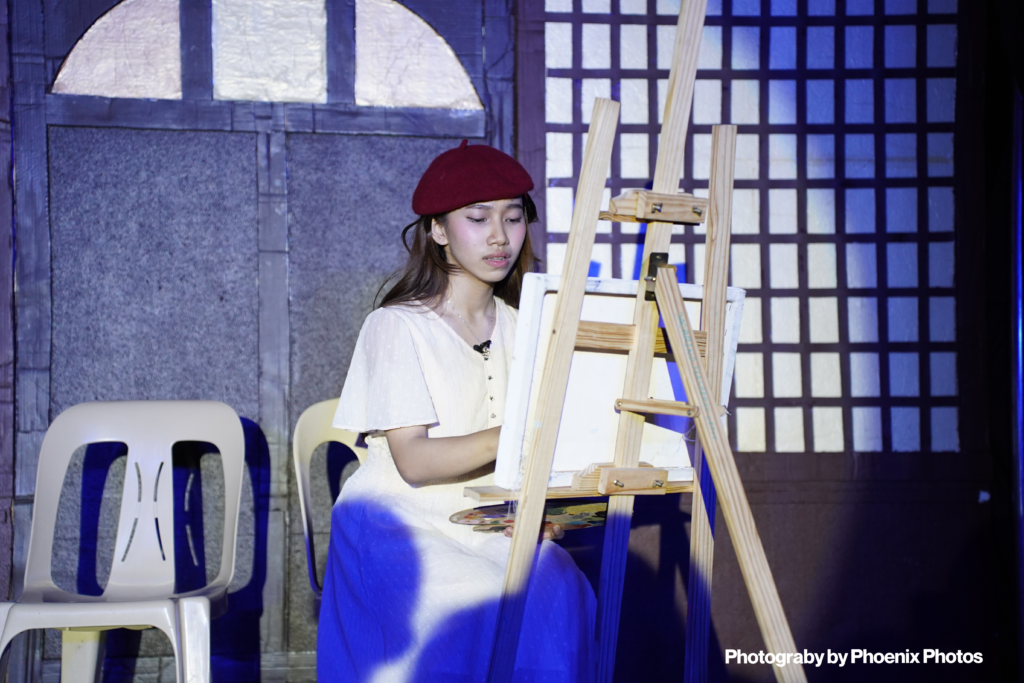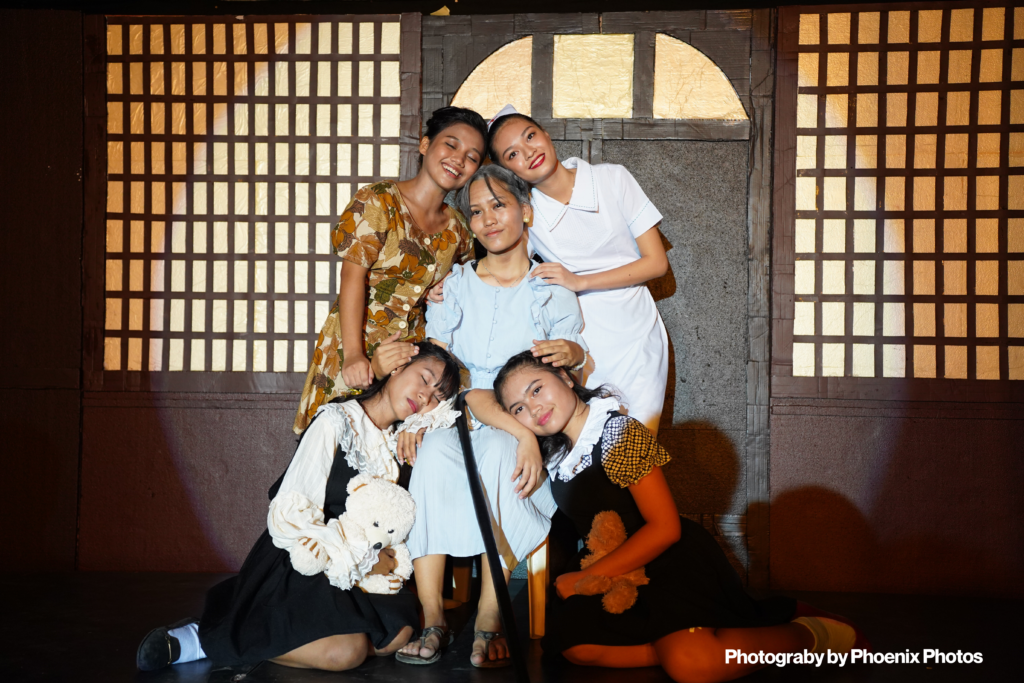

Risa: The Echoes of a Silent Brush’s approach on war and the death of dreams
- Features
- May 31, 2024
- Mel Francis Amadora
- photos byPhoenix Photos
I went to Sto. Niño Mactan Montessori School on May 28 with little idea what this play was about. I was only told moments after the curtains had risen and everything went dark: first, that this was set in 1940’s Bataan, during the Japanese Occupation, and second, that it was a musical. Both were enough to keep me in my seat already.
Risa: The Echoes of a Silent Brush tackles the idea of life in wartime in a way that may seem underwhelming at first. They announce the setting as it is, but barely include the war into the story. However, as the play came to a close, I eventually began to appreciate how they individualized life in war through the characters and their circumstances. War is present in the musical: it is the ruthless, unrelenting taker of lives. War is what cut Risa’s life short. War and death are nihilistic beings that distort the momentum of life, as well as the meaning of living. The stories of these characters were nipped from their buds before they could even blossom, and in the grand scheme of things, these people were just numbers on a tally.
War is unnatural, where days feel like a blur to soldiers. It’s not the fault of the medium that captured the war – film, photos, or written accounts – but it has an inherent value that it cannot be understood. In Julia Halperin’s Can the Pen Match the Sword? A Look at the Value of Words in the Depiction of War, she emphasized poetry, fiction and theatre as media that can truly capture the experience of war, because of the way they are told – the plot, the characters, the lines in the text, and the essence of the real story (or story-truths, as Tim O’Brien called it). These elements are what set stories like this musical apart from the depiction of war in reports and documentations – on accuracy first, before emotion. But in the process of accuracy, the viewers are merely limited to being observers.

That’s why I like the fact that we, the audience, were denied seeing what Risa was painting before she was caught by the soldiers. It embodies the “silent brush” in the title, and matches the lyrics of her song (it goes along the lines of “…painting shapes no one can see.”) It’s not only an expression of her plight as an unrecognized artist, but it’s a reflection of the stories of people in Bataan during the war that are long unretrievable. Casualties receive double the neglect. Their safety is breached, and their memories become lost among their numbers. Today, this double neglect reflects Palestine, where people’s names appear in our screens one by one, asking for our help. Clearly we are shaken by the danger they experience, yet their names only linger on our minds as short as our attention spans.
By the end, she wakes up with her paintings, her life already finished. It’s just like the photos of war, taken and shown to the public, images so clear to the eyes but devoid of the feelings of those who experienced it.
It is for this same reason that my favorite song in the musical is the one Maria sings in the middle of the play (for reasons of familiarity, I’ll call it “Born to Help”). Aside from the fact that she performed it very well, the lyrics themselves are impactful, particularly the lines she mentions about doing this job of caregiving where there’s no attention or recognition. Maria (top-left of the photo) gave her life for pure, authentic social work, and just like Risa’s unseen painting, Maria’s story is just one of the many unwritten ones in Bataan. Not only that, but by singing this song, she creates a beautiful paradox. She sings that her work will go unnoticed, but the audience can hear her voice. We can hear her tell her story, and resonating with her voice are those of the many doctors, nurses, and caregivers who poured their hearts out for the injured. The war in Bataan was gruesome even before it began. Many soldiers died in hospitals from injuries, malaria, and dysentery when they had no choice but to eat rotting meat and drink unfiltered water. It wasn’t only a war between men, but also a war with nature.

Overall, the musical exceeded the message of just Risa’s life. It is a collection of stories that broke the walls of invisibility, wrote another way of seeing life in Bataan, and tugged at our hearts in short, fleeting moments. Good job, Grade 11 – Freedom and Grade 12 – Veracity! And congratulations on completing all performances of this production.
PHOTO GALLERY









ABOUT THE AUTHOR
READ MORE
06 February 2026
I remember once taking a long walk just to see a place people kept talking about.
It was an uphill hike to the tip of the mountain, a stroll in a forest, roads that pass by small villages and narrow rivers, and lots and lots of potholed roads and gnarled pathways that’d cause a stumble here and there, but promised a sight that would take breaths away.
It was a week-long walk. I wondered why I even started walking.
The path inclined more and more that it felt more like climbing than just walking. The kilometers just increased each day. And the roads just got longer and bumpier the further I went. My legs ached so much that at that point, I couldn’t feel them. I was nauseated, flabbergasted, and dreading every next day that came. The more we continued the camino, the more reason I wanted to go back the way I came from. There was no shortcut, just the road, stretching forward, asking me to continue.
That’s how the year feels so far.
28 December 2025
On the 19th of November,
leaves retreat from the branches,
struggles to find new home amongst the grasses,
its voyage with the wind stucks in memory,
You have you poured,
twigs broken in harmony.
25 December 2025
When love and laughter has exhausted themselves after Christmas Eve, Day, New Year’s Eve, and finally the New Year, I’m left with the memories of it, a standstill of the joy captured, frozen in time. Just like that, party’s officially over. The gifts have been open, the money inside the envelopes evaporated, and the paksiw finally consumed in its entirety. A gaping hole that emerged right after the most festive season, a longing for it to go on forever. Nevertheless, it’s a constant reminder that joy will only ever be appreciated when we’re bombarded with everything else, that it’s spent sparsely, in order for us to appreciate life and the things that come with it, with Christmas being one merry example.
24 December 2025
Every house filled with festive trinkets and a an often wobbly yet earnestly built Christmas tree create a welcome atmosphere to the joyous season; yet, to many people, their homes find genuine warmth by embracing the true mark of the beginning of Christmas through the nine-day observance of Simbang Gabi or Mass at Dawn. But why is it that the majority of Catholic Filipinos flock to churches at such an early hour? Is it for the supposed wish that would be bestowed on a person should they complete all days of Simbang Gabi? Or is there more to the tradition that families and friends celebrate in the days leading up to Christmas?
16 December 2025
The flawed walkways taught me soon enough,
I am made to be agile and nimble.
It wasn't too hard to memorize the road.
No older than fifteen,
I was told I was small
by the sidewalk that narrowed.
And when September came,
Jose Mari Chan would find his way back.
Singing in new speakers and old radios
notes dancing in the parol workshops
which lined that Old Cabuyao Road.
Stars are waking up then the light glows.
09 December 2025
Behold the Moon on the vigil’s quiet hours,
Silvering the sky amidst the dark nights
Her glow serene above shadowed bowers
And guides souls from the blinding lights.
For the moon is a mirror, so still and clear,
Of the light she bears from the Sun.
A lustre that dims every single murk of fear,
The beacon that points to the face of her Son.
21 November 2025
On November 29, 2023, former US Secretary of State Henry Kissinger passed away at the age of 100. There lies a man known worldwide, which is odd given despite being the topmost position in the executive department behind the president in history’s biggest empire, secretaries of state don’t often get to the fame, or infamy rather, of Kissinger.
03 November 2025
You once asked me how it feels to
live far from home,
and I told you in Cebu, the first
words I learned wasn’t maayong buntag—
but amping.
02 November 2025
We are food for worms, says John Keating in Dead Poets Society. It’s humbling to die, and it’s devastating to be gone and face your own end like the rest of humanity, or even seeing others facing theirs. Sometimes, to grieve is to expect somebody’s return, but a dead person isn’t coming back, so what you could only do is to stare at the tombstone, as if it were to look at a past history.
30 October 2025
The beauty of language lies in its cultural variance, shifting in symbols and intonations across localities and nations. But what becomes of beauty when its met with foreign counterparts? Misunderstanding boils like a bubbling stew. Wars are waged, conflict spits in the face of peace, and blood is spent. Enter translation, where differing tongues find common ground, utilized in various social affairs that span across empires and ages throughout history.
06 February 2026
I remember once taking a long walk just to see a place people kept talking about.
It was an uphill hike to the tip of the mountain, a stroll in a forest, roads that pass by small villages and narrow rivers, and lots and lots of potholed roads and gnarled pathways that’d cause a stumble here and there, but promised a sight that would take breaths away.
It was a week-long walk. I wondered why I even started walking.
The path inclined more and more that it felt more like climbing than just walking. The kilometers just increased each day. And the roads just got longer and bumpier the further I went. My legs ached so much that at that point, I couldn’t feel them. I was nauseated, flabbergasted, and dreading every next day that came. The more we continued the camino, the more reason I wanted to go back the way I came from. There was no shortcut, just the road, stretching forward, asking me to continue.
That’s how the year feels so far.
28 December 2025
On the 19th of November,
leaves retreat from the branches,
struggles to find new home amongst the grasses,
its voyage with the wind stucks in memory,
You have you poured,
twigs broken in harmony.
25 December 2025
When love and laughter has exhausted themselves after Christmas Eve, Day, New Year’s Eve, and finally the New Year, I’m left with the memories of it, a standstill of the joy captured, frozen in time. Just like that, party’s officially over. The gifts have been open, the money inside the envelopes evaporated, and the paksiw finally consumed in its entirety. A gaping hole that emerged right after the most festive season, a longing for it to go on forever. Nevertheless, it’s a constant reminder that joy will only ever be appreciated when we’re bombarded with everything else, that it’s spent sparsely, in order for us to appreciate life and the things that come with it, with Christmas being one merry example.
24 December 2025
Every house filled with festive trinkets and a an often wobbly yet earnestly built Christmas tree create a welcome atmosphere to the joyous season; yet, to many people, their homes find genuine warmth by embracing the true mark of the beginning of Christmas through the nine-day observance of Simbang Gabi or Mass at Dawn. But why is it that the majority of Catholic Filipinos flock to churches at such an early hour? Is it for the supposed wish that would be bestowed on a person should they complete all days of Simbang Gabi? Or is there more to the tradition that families and friends celebrate in the days leading up to Christmas?
16 December 2025
The flawed walkways taught me soon enough,
I am made to be agile and nimble.
It wasn't too hard to memorize the road.
No older than fifteen,
I was told I was small
by the sidewalk that narrowed.
And when September came,
Jose Mari Chan would find his way back.
Singing in new speakers and old radios
notes dancing in the parol workshops
which lined that Old Cabuyao Road.
Stars are waking up then the light glows.
09 December 2025
Behold the Moon on the vigil’s quiet hours,
Silvering the sky amidst the dark nights
Her glow serene above shadowed bowers
And guides souls from the blinding lights.
For the moon is a mirror, so still and clear,
Of the light she bears from the Sun.
A lustre that dims every single murk of fear,
The beacon that points to the face of her Son.
21 November 2025
On November 29, 2023, former US Secretary of State Henry Kissinger passed away at the age of 100. There lies a man known worldwide, which is odd given despite being the topmost position in the executive department behind the president in history’s biggest empire, secretaries of state don’t often get to the fame, or infamy rather, of Kissinger.
03 November 2025
You once asked me how it feels to
live far from home,
and I told you in Cebu, the first
words I learned wasn’t maayong buntag—
but amping.
02 November 2025
We are food for worms, says John Keating in Dead Poets Society. It’s humbling to die, and it’s devastating to be gone and face your own end like the rest of humanity, or even seeing others facing theirs. Sometimes, to grieve is to expect somebody’s return, but a dead person isn’t coming back, so what you could only do is to stare at the tombstone, as if it were to look at a past history.
30 October 2025
The beauty of language lies in its cultural variance, shifting in symbols and intonations across localities and nations. But what becomes of beauty when its met with foreign counterparts? Misunderstanding boils like a bubbling stew. Wars are waged, conflict spits in the face of peace, and blood is spent. Enter translation, where differing tongues find common ground, utilized in various social affairs that span across empires and ages throughout history.
